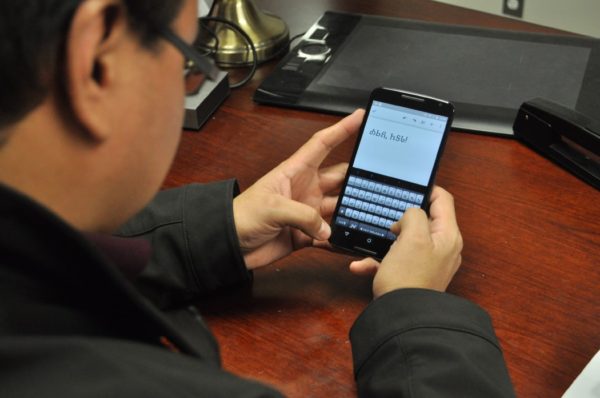
- Details
- By Native News Online Staff
TAHLEQUAH, Okla. — The Cherokee language is coming to public television.
Cherokee Nation and Rogers State University Public TV (RSU) have joined forces to launch the first televised Cherokee language learning course, beginning January 13.
The telecourse consists of 48 episodes, each about 50 minutes long and taught by Cherokee Nation Language Technology Specialist Wade Blevins. The telecourse is titled Cherokee I and will air at 11 a.m. on Mondays, Wednesdays and Fridays on RSU TV during the RSU spring semester. For those not living in RSU TV’s coverage area can access the courses online at www.rsu.tv/cherokee.
“Preserving and perpetuating the Cherokee language will take a tremendous amount of resources, so it’s exciting to see partnership opportunities such as this come along,” said Cherokee Nation Principal Chief Chuck Hoskin Jr. “Teaming up with Rogers State University gives us new avenues for teaching the Cherokee language, and that means more and more Cherokees – and perhaps even those who are not Cherokee – have easy access to this beginners-level course.”
The Cherokee Nation Language Program will also offer a certificate of completion for those who register for the class on the Cherokee Nation website and complete the associated quizzes with a score of 80 percent or higher.
Participants who wish to earn the certificate of completion from the Cherokee Nation Language Program should enroll on the Cherokee Nation website at learn.cherokee.org. For more information about enrolling in Cherokee I online through Rogers State University, visit www.rsu.edu/admissions/enrollment.
More Stories Like This
Native News Weekly (August 25, 2024): D.C. BriefsNavajo Nation Mourns the Passing of Former Vice President Rex Lee Jim
Deb Haaland Earns Endorsement From Communications Workers of America Local 7076
University Soccer Standout Leads by Example
Two Native Americans Named to Democratic Congressional Campaign Committee's“Red to Blue” Program
Help us defend tribal sovereignty.
At Native News Online, our mission is rooted in telling the stories that strengthen sovereignty and uplift Indigenous voices — not just at year’s end, but every single day.
Because of your generosity last year, we were able to keep our reporters on the ground in tribal communities, at national gatherings and in the halls of Congress — covering the issues that matter most to Indian Country: sovereignty, culture, education, health and economic opportunity.
That support sustained us through a tough year in 2025. Now, as we look to the year ahead, we need your help right now to ensure warrior journalism remains strong — reporting that defends tribal sovereignty, amplifies Native truth, and holds power accountable.
 The stakes couldn't be higher. Your support keeps Native voices heard, Native stories told and Native sovereignty defended.
The stakes couldn't be higher. Your support keeps Native voices heard, Native stories told and Native sovereignty defended.
Stand with Warrior Journalism today.
Levi Rickert (Potawatomi), Editor & Publisher

